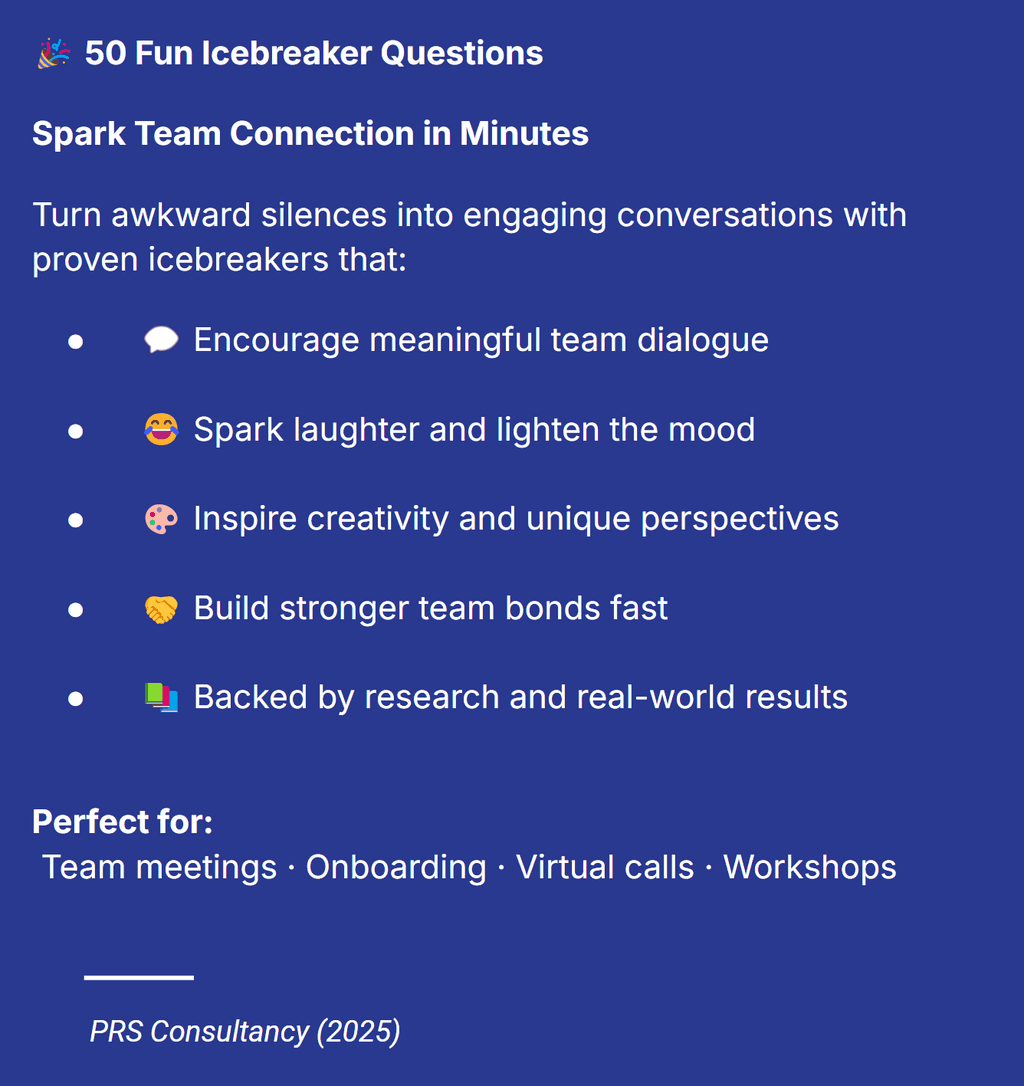Have you ever sat in an awkward silence at the beginning of a meeting, wishing someone would say something—anything—to get the conversation flowing? I've been there too many times to count. That's why I've spent years collecting and testing these icebreaker questions with teams of all sizes and across various industries.
These aren't just random questions I found online. Each one has been field-tested in real meetings and team-building sessions I've facilitated, where I've witnessed firsthand how the right question can transform a room of strangers into engaged collaborators in minutes.
According to a study by Harvard Business School, meetings that begin with a personal check-in or icebreaker question show significantly improved problem-solving and collaboration. That small investment of time upfront pays tremendous dividends in engagement and productivity.
Let's dive into these conversation starters that I promise will banish awkward silences for good!

Laugh-Out-Loud Conversation Starters
When I used these questions with my marketing team's weekly stand-ups, the energy in the room shifted immediately—even on Monday mornings!
- If you could have an unlimited supply of one thing forever, what would you pick? (My team's most popular answer: sleep!)
- What's your karaoke power song that gets you on your feet no matter what?
- If animals could talk, which would definitely have a sarcastic personality?
- What embarrassing fashion choice from your past makes you cringe now?
- If your life had entrance music like wrestlers do, what song would play when you walk into a room?
- What weird talent do you have that most people don't know about?
- If you could safely eat any non-food item, what would you be curious to taste?
- What's the funniest misunderstanding you've ever had with someone?
- If you could have dinner with any fictional character, who would it be and what would you order?
- What's the strangest place you've ever fallen asleep? (My personal answer: standing up on the subway!)
As Gallup's research on workplace engagement shows, teams that laugh together stay together—with humor being directly linked to higher retention rates and job satisfaction.
Mind-Expanding Imagination Boosters
I love using these questions in creative brainstorming sessions to get people thinking beyond their usual patterns:
- If you could instantly master any skill, what would it be and how would you use it?
- If you could invent a holiday, what would it celebrate and what traditions would it include?
- What fictional world would you most want to visit and what role would you play there?
- If you could solve one global problem with the snap of your fingers, which would you choose?
- If you could witness any historical event firsthand, what would you choose to see?
- What knowledge do you wish you could download directly into your brain, Matrix-style?
- What would you tell your 10-year-old self if you could have a five-minute conversation?
- What book, movie, or show fundamentally changed how you see the world?
- If you could safely experience any natural phenomenon up close, what would you choose?
- If you had to live in a different era for a year, when would you choose and why?
The World Economic Forum lists creativity as one of the top skills needed for future workplace success—these questions help flex those creative muscles in a low-pressure way.
Wanderlust and Adventure Sparks
I started using these travel-themed questions during virtual meetings during the pandemic, and they provided a much-needed mental escape:
- If you could teleport anywhere for just 24 hours, where would you go right now?
- What's the most breathtaking natural wonder you've seen with your own eyes?
- What's the #1 destination on your travel bucket list and why hasn't it happened yet?
- What's the most adventurous thing you've ever done while traveling?
- If you could live anywhere in the world for a year, no logistics to worry about, where would you choose?
- What travel experience taught you something unexpected about yourself?
- If you could road trip with anyone (living or historical), who's riding shotgun and where are you headed?
- What's the most unforgettable meal you've had while traveling? (I still dream about a pasta dish I had in a tiny restaurant in Rome!)
- If you could instantly become fluent in any language, which would you choose?
- What place completely defied your expectations when you visited?
According to research from Cornell University, talking about travel experiences creates more happiness and connection than discussing material purchases.
Personal Growth Reflections
These questions create psychological safety, which Google's Project Aristotle identified as the #1 factor in high-performing teams:
- What small habit has made a surprisingly big positive impact on your life?
- What are you excited to learn or improve at this year?
- What challenge have you overcome that you're particularly proud of?
- What activity makes you lose all track of time in the best possible way?
- What advice would you give someone starting in your field tomorrow?
- What's something you used to firmly believe that you've completely changed your mind about?
- Who has been your most positive professional influence and what did they teach you?
- What recent small win brightened your day?
- What's one thing you wish colleagues understood better about you?
- What qualities do you value most in the people you work with?
Team Chemistry Builders
I've used these questions specifically with newly formed teams to accelerate the trust-building process:
- If you could shadow anyone in our organization for a day, who would you choose and why?
- What's been your most rewarding project or accomplishment since joining us?
- What's something our team does exceptionally well that you appreciate?
- If you could add one perk or tradition to our workplace, what would make work more enjoyable?
- What skill or knowledge do you have that might surprise your colleagues?
- What's the best professional advice someone gave you that you still follow?
- If our team were a movie genre, which would we be and which character would you play?
- What have you learned from a teammate recently that you found valuable?
- If you could create a new team ritual, what would it be?
- What aspect of our culture do you value most and why?
How I Use These Questions (and How You Can Too)
After facilitating hundreds of meetings, here's what I've learned about making icebreakers truly effective:
- Match the energy level to the meeting: For Monday mornings, I start with lighter questions (#1-10). For strategic planning sessions, I go with the deeper ones (#31-40).
- Follow the 10% rule: A good icebreaker should take up about 10% of your total meeting time. For a 60-minute meeting, aim for 5-6 minutes.
- Answer first: When I facilitate, I always answer first to model the appropriate depth and tone. This immediately reduces anxiety for others.
- Make it optional: I always say, "Feel free to pass if you'd prefer." In practice, fewer than 5% of people take the pass option when given this freedom.
- Listen actively: The magic happens not just in the answers, but in the spontaneous connections that form when people realize shared interests. Make space for these organic "me too!" moments.
According to the National Research Council on team effectiveness, these small moments of connection significantly impact a team's ability to collaborate effectively when faced with challenges.
From Awkward to Awesome
I remember facilitating a leadership retreat where the executives seemed guarded and formal at first. Starting with question #39 ("What's one thing you wish people understood better about you?") completely transformed the atmosphere. One leader vulnerable shared her impostor syndrome, which prompted authentic sharing from others. The strategic planning that followed was the most productive the group had ever experienced.
The research is clear, but my personal experience confirms it: these aren't just fun questions—they're powerful tools for creating the psychological safety and connection that underpin high-performing teams.
What icebreaker will you try in your next meeting? I'd love to hear which ones work best for your team!
